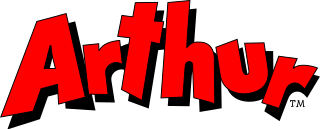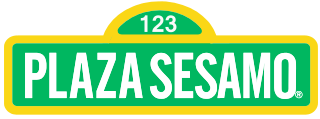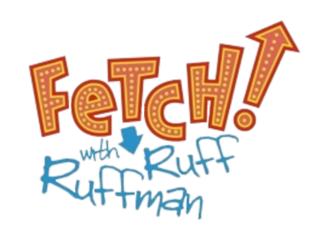Related Research Articles

Time Team is a British television programme that originally aired on Channel 4 from 16 January 1994 to 7 September 2014. It returned in 2022 on online platforms YouTube and Patreon. Created by television producer Tim Taylor and presented by actor Tony Robinson, each episode featured a team of specialists carrying out an archaeological dig over a period of three days, with Robinson explaining the process in lay terms. The specialists changed throughout the programme's run, although it consistently included professional archaeologists such as Mick Aston, Carenza Lewis, Francis Pryor and Phil Harding. The sites excavated ranged in date from the Palaeolithic to the Second World War.

Arthur is an animated edutainment television series for children ages 4 to 8, developed by Kathy Waugh for PBS and produced by WGBH. The show is set in the fictional U.S. city of Elwood City and revolves around the lives of Arthur Read, an anthropomorphic aardvark, his friends and family, and their daily interactions with each other.

Frontline is an investigative documentary program distributed by the Public Broadcasting Service (PBS) in the United States. Episodes are produced at WGBH in Boston, Massachusetts. The series has covered a variety of domestic and international issues, including terrorism, elections, environmental disasters, and other sociopolitical issues. Since its debut in 1983, Frontline has aired in the U.S. for 39 seasons, and has won critical acclaim and awards in broadcast journalism. It has produced over 750 documentaries from both in-house and independent filmmakers, 200 of which are available online.

George Edward Lopez is an American stand-up comedian and actor. He is most known for starring in his self-produced ABC sitcom. His stand-up comedy examines race and ethnic relations, including Mexican American culture. Lopez has received several honors for his work and contributions to the Latino community, including the 2003 Imagen Vision Award, the 2003 Latino Spirit Award for Excellence in Television and the National Hispanic Media Coalition Impact Award. He was also named one of "The Top 25 Hispanics in America" by Time magazine in 2005.

Plaza Sésamo is one of the first international co-productions of the first preschool television program Sesame Street. Its first season premiered in Mexico in 1972, and the last season ended in 2018 during the holiday season and the 50th anniversary of Sesame Street, but the show returned in 2020 and was immediately a ratings hit. It also aired throughout Latin America, to a potential audience of 25 million children in 34 countries. Unlike some of the earliest co-productions, which consisted of dubbed versions of Sesame Street with local language voice-overs, Plaza Sésamo was a true co-production. Half of the show was adapted from the American show, and half was original material, created in Mexico by Mexican writers, performers, and producers. The first season consisted of 130 half-hour episodes. The Plaza Sésamo development process was similar to that of the American show. Its goals were developed by local experts in television, child development, and early education during curriculum seminars in Caracas, Venezuela. Sésamo's goals emphasized problem solving and reasoning, and also included perception, symbolic representation, human diversity, and the child's environment. Other goals included community cooperation, family life, nutrition, health, safety, self-esteem, and expressing emotions. Early reading skills were taught through the whole language method. The show's budget for the first and second seasons was approximately US$1.6 million.
Good Eats is an American television cooking show, created and hosted by Alton Brown, which aired in North America on Food Network and later Cooking Channel. Likened to television science educators Mr. Wizard and Bill Nye, Brown explores the science and technique behind the cooking, the history of different foods, and the advantages of different kinds of cooking equipment. The show tends to focus on familiar dishes that can easily be made at home, and also features segments on choosing the right appliances, and getting the most out of inexpensive, multi-purpose tools. Each episode has a distinct theme, which is typically an ingredient or a certain cooking technique, but may also be a more general theme such as Thanksgiving. In the tenth anniversary episode, Brown stated that the show was inspired by the idea of combining Julia Child, Mr. Wizard, and Monty Python. On May 11, 2011, Brown confirmed that the series would come to an end, ceasing production at episode 249. Good Eats is the third longest running Food Network series, behind 30 Minute Meals and Barefoot Contessa.
Doctor Who in Canada and the United States refers to the broadcast history of the long-running British science fiction television series Doctor Who in those countries.

Most Haunted is a British paranormal reality television series. Following complaints, the broadcast regulator, Ofcom, ruled that it was an entertainment show, not a legitimate investigation into the paranormal, and "should not be taken seriously".

Ghostwriter is a children's mystery television series created by Liz Nealon and produced by Children's Television Workshop and BBC Television. The series revolves around a multiethnic group of friends from Brooklyn who solve neighborhood crimes and mysteries as a team of youth detectives with the help of a ghost named Ghostwriter. Ghostwriter can communicate with children only by manipulating whatever text and letters he can find and using them to form words and sentences. The series was filmed on location in Fort Greene, Brooklyn. It began airing on PBS on October 4, 1992, and the last episode aired on February 12, 1995. It reran on Noggin, a channel co-founded by the Children's Television Workshop, from 1999 to 2003.
WPBT, is a PBS member television station in Miami, Florida, United States. It serves as the flagship station of South Florida PBS, which also owns Boynton Beach-licensed fellow PBS member WXEL-TV and Miami-licensed Class A station WURH-CD. The three stations share transmitter facilities on Northwest 199th Street in Andover; WPBT's studios are located on Northeast 20th Avenue in North Miami. In addition to serving the Miami–Fort Lauderdale market, the station has significant viewership in much of the West Palm Beach market, and is the only Miami area television station to serve the entire South Florida metropolis.

Survivorman is a Canadian-produced television program, broadcast in Canada on the Outdoor Life Network (OLN), and internationally on Discovery Channel and Science Channel. The title refers to the host of the show, Canadian filmmaker and survival expert Les Stroud, who uses survival skills and knowledge to survive alone for up to ten days, in remote locales where he brings with him little or no food, water, or equipment. Each location was scouted and planned extensively by Stroud and his team who consulted with survival specialists and natives of each area. The fact that Stroud films the episodes himself and endures the challenges of the wilderness, while dealing with the concomitant mental, emotional and physical stresses, is a major focus of the show.
Great Performances is a television anthology series dedicated to the performing arts; the banner has been used to televise theatrical performances such as plays, musicals, opera, ballet, concerts, as well as occasional documentaries. It is produced by the PBS member station WNET in New York City.

Fetch! with Ruff Ruffman is an American live-action/animated television series that aired on PBS Kids Go! and is largely targeted toward children ages 6–10. It is a reality-game show that is hosted by an animated anthropomorphic dog named Ruff Ruffman who dispenses challenges to the show's real-life contestants. The series ran for five seasons and 100 episodes from May 29, 2006, to November 4, 2010, on PBS, with 30 contestants in that time. Although a sixth season was planned, with auditions taking place in January 2010, WGBH announced on June 14, 2010, that due to lack of funding, the series would end. In June 2008, the series received its first Emmy for Best Original Song for its theme.

WordGirl is an American children's Flash animated superhero television series produced by the Soup2Nuts animation unit of Scholastic Entertainment for PBS Kids. The series began as a series of shorts entitled The Amazing Colossal Adventures of WordGirl that premiered on PBS Kids Go! on November 10, 2006, usually shown at the end of Maya & Miguel; the segment was then spun off into a new thirty-minute episodic series that premiered on September 3, 2007 on most PBS member stations. The series of shorts consisted of thirty episodes, with 130 episodes in the full half-hour series.

Flashpoint is a Canadian police procedural crime drama television series created by Mark Ellis and Stephanie Morgenstern. The series debuted on July 11, 2008, on CTV in Canada and on CBS and Ion Television in the United States. The series starred Hugh Dillon, Amy Jo Johnson, David Paetkau, Sergio Di Zio, and Enrico Colantoni.

Planet Forward, a project of The George Washington University's School of Media and Public Affairs, is an online public forum where experts, engaged citizens and students weigh in on energy, climate and sustainability. The most inventive and creative ideas are featured online.

American Pickers is an American reality television series that premiered on January 18, 2010, on the History channel, produced by A&E Television Networks in collaboration with Cineflix Media. In the series, the hosts travel across America in search of rare Americana artifacts and national treasures that they can buy from the collectors to add to their personal collections or sell in their antique shops.

Antiques Roadshow is an American television program broadcast on Public Broadcasting Service (PBS) Public television stations. The program features local antiques owners who bring in items to be appraised by experts. Provenance, history, and value of the items are discussed. Based on the original British Antiques Roadshow, which premiered in 1979, the American version first aired in 1997. When taping locations are decided, they are announced on the program's website raising the profile of various small to mid-size cities, such as Billings, Montana; Biloxi, Mississippi; Bismarck, North Dakota; Chattanooga, Tennessee; Hot Springs, Arkansas; and Rapid City, South Dakota. Antiques Roadshow has been nominated 16 times for a Primetime Emmy.

Curiosity is an American documentary television series that premiered on August 7, 2011, on the Discovery Channel. Each episode focuses on one question in science, technology, and society and, for the first season, features a different celebrity host. Stephen Hawking hosted the premiere episode titled "Did God Create the Universe?", which aired simultaneously on seven Discovery Communications networks: Discovery Channel, TLC, Discovery Fit and Health, Animal Planet, Science, Investigation Discovery, and Destination America. Season one consists of 16 episodes.
Eater is a food website by Vox Media. It was co-founded by Lockhart Steele and Ben Leventhal in 2005, and originally focused on dining and nightlife in New York City. Eater launched a national site in 2009, and covered nearly 20 cities by 2012. Vox Media acquired Eater, along with two others comprising the Curbed Network, in late 2013. In 2017, Eater had around 25 local sites in the United States, Canada, and England. The site has been recognized twelve times by the James Beard Foundation Awards.
References
- ↑ "About Time Team". Credits. PBS . Time Team America. Retrieved 16 August 2009.
- ↑ "About Time Team". PBS . Time Team America. Retrieved 16 August 2009.
- 1 2 "Digging (against the clock) for history". The New York Times . 29 May 2009.
- ↑ "PBS' Time Team America". Facebook . 18 October 2011. Retrieved 14 February 2012.
- ↑ "Time Team America". PBS (home page). Retrieved February 14, 2012.
- ↑ "PBS' Time Team America". Facebook . 20 December 2011. Retrieved 14 February 2012.
- ↑ "Site Reports". PBS . Time Team America. — from the show's website
- ↑ "About Time Team". Broadcast information. PBS . Time Team America. Retrieved 16 August 2009.
- ↑ "Fort Raleigh". Site Reports. PBS . Time Team America. Retrieved 16 August 2009.
- ↑ "Topper". Site Reports. PBS . Time Team America. Retrieved 16 August 2009.
- ↑ "New Philadelphia". Site Reports. PBS . Time Team America. Retrieved 16 August 2009.
- ↑ "Range Creek". Site Reports. PBS . Time Team America. Retrieved 16 August 2009.
- ↑ "Fort James". Site Reports. PBS . Time Team America. Retrieved 16 August 2009.
- ↑ "Time Team America, archaeology on PBS". Newsday (review). 8 July 2009. Retrieved 2021-10-26.[ dead link ]
- ↑ "Time Team America". PBS Shop. Retrieved 15 August 2009.